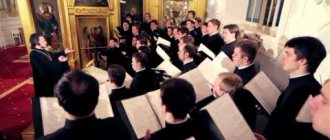with your prayers
Phraseological dictionary of the Russian literary language. - M.: Astrel, AST. A. I. Fedorov. 2008.
See what “Through your prayers” is in other dictionaries:
your prayers - adverb, number of synonyms: 1 • thank you (32) ASIS Dictionary of Synonyms. V.N. Trishin. 2013 ... Dictionary of synonyms
With your prayers! — Answer to questions: how are you?, how are you living? ... Dictionary of folk phraseology
your prayers - colloquial. , joke is said in response to the question: “How are you?” or “How are you?” in the meaning of “thank you, nothing” as an expression of gratitude for a sympathetic attitude... A reference book on phraseology
We live on your prayers. - see Alive by your sins, by your prayers... V.I. Dahl. Proverbs of the Russian people
Alive by your sins, by your prayers. - We live on your prayers. Alive by your sins, by your prayers. See ABUSE HELLO... V.I. Dahl. Proverbs of the Russian people
With your (holy) prayers (as we support ourselves with poles) - with your (holy) prayers (as we support ourselves with poles), monk. thanks to your prayers (answer in the form of an assumption of goodwill and participation on the part of the person asking about their state of health, affairs, etc.). Wed. How the Lord God has mercy on you,... ... Michelson's Large Explanatory and Phraseological Dictionary (original spelling)
with your (holy) prayers (as if we are propped up with poles) - monastic: thanks to your prayers (answer in the form of an assumption of goodwill and participation on the part of the person asking about the state of health, affairs, etc.) Cf. How the Lord God has mercy on you, will I make everything better? By your holy prayers, mother. ... ... Michelson's Large Explanatory and Phraseological Dictionary
ABUSE - HELLO - Resin is not water, abuse is not hello. Why did I (you, him) have to be born! It would be better if you were not born! The friend is a sieve, the sieve is (not) rattled through. God would love you as much as you love me! What haven't you seen? What have you forgotten here? It would be your verdict, but you... ... V.I. Dahl. Proverbs of the Russian people
smile - (about the sun, nature, happiness) foreigner: joyfully, look favorably (as someone who smiles looks) Wed. Smile (of fortune). Wed. Our hero’s brilliant position was temporary, he himself felt it, and therefore was not at all carried away by the smile of Fortune. ... ... Michelson's Large Explanatory and Phraseological Dictionary
Smile - (about the sun, nature, happiness) monk. look joyfully, benevolently (like someone who smiles looks). Wed. Smile (of fortune). Wed. The brilliant position of our hero was temporary, he himself felt it, and therefore, without being at all carried away by the smile of fortune... Michelson's large explanatory and phraseological dictionary (original spelling)
Prayer before starting anything
Audio:
1:12
Heavenly King, Comforter, Soul of truth, Who is everywhere and fulfills all things, Treasure of good things and Giver of life, come and dwell in us, and cleanse us from all filthiness, and save us, Blessed Well, our souls. Bless, Lord, and help me, a sinner, to complete the work I have begun, for Your glory. Lord Jesus Christ, the Only Begotten Son of Your Beginning Father, for You declared with Your most pure lips that without Me you cannot do anything. My Lord, Lord, with faith in my soul and heart, spoken by You, I bow down to Your goodness: help me, a sinner, to accomplish this work, which I have begun, for You. You, in the name of the Father and the Son and the Holy Spirit, through the prayers of the Mother of God and all Your saints . Amen.
Translation: Heavenly King, Comforter, Spirit of Truth, abiding everywhere and filling everything, Treasury of blessings and Giver of life, come and dwell in us, and cleanse us from all filth, and save, O Good One, our souls. Bless, Lord, and help me, a sinner, to complete the work I have begun, for Your glory. Lord Jesus Christ, Only Begotten Son of Your Beginning Father, You told us with Your most pure lips: “Without Me you can do nothing” (John 15:5). My Lord, Lord, I believe with all my soul and heart what You said, I bow down to Your goodness and pray to You: help me, a sinner, to complete this work, which I have begun, for You, in the name of the Father and the Son and the Holy Spirit, through the intercessions of the Holy Mother of God and all saints Amen.
What does expressing your prayers mean?
What do they mean when they say “through your prayers”? Where did this expression come from?
It means that someone is praying for you, and you are protected by the prayers of that person. Usually said with sarcasm. Through your prayers - unraveling. joking - says in response to the question: “How are you?” or “How is your health?” meaning “thank you, nothing.” As an expression of gratitude for your sympathetic attitude.
This expression means the answer to the question “How are you doing?”, “How are you feeling?”, How is your family?” etc. The expression “Through your prayers” has the meaning of gratitude for asking this question and with the meaning that everything is fine. According to assumptions, this expression came about when Father was treating a child (praying for him, etc.) and asked the mother a question: “How is your child’s health?”, to which he received the answer “With your prayers!”
In the Literature section, to the question Where did the expression “by your (your) prayers” come from? And what exactly does it mean? the method given by the author, the best answer is This is what they say to a person in gratitude for his warm participation and care. That is, “everything worked out for me thanks to your advice, your kindness.” Originally it meant that someone prayed for me, it helped, and now I thank him so much. Ella Kuznetsova Higher intelligence (116912) Praying is unlikely. But such an answer means that the person answering understands the question as friendly, even suggesting a desire to help, and not just a formality. Of course, this is very conditional. But even a simple “thank you” no longer means “God bless you,” but simply a polite answer.
your prayers - adverb, number of synonyms: 1 • thank you (32) ASIS Dictionary of Synonyms. V.N. Trishin. 2013 ... Dictionary of synonyms
With your prayers! — Answer to questions: how are you?, how are you living? ... Dictionary of folk phraseology
your prayers - colloquial. , joke is said in response to the question: “How are you?” or “How are you?” in the meaning of “thank you, nothing” as an expression of gratitude for a sympathetic attitude... A reference book on phraseology
We live on your prayers. - see Alive by your sins, by your prayers... V.I. Dahl. Proverbs of the Russian people
What is prayer?
The word “prayer” itself has many meanings. In religion, to pray means to turn to God, Saints or Patrons.
Prayer is an appeal to God or to his hierarchy (Angels, Archangels, Saints) for the purpose of: 1) repentance; 2) gratitude; 3) requests for help.
Prayer is an effective energy tool for the development of the Soul. Technically correct prayer clearly influences a person’s fate and karma.
When reading prayers, it is important to sincerely believe in what you are saying. By turning to God, we open our inner world. We thank the Almighty and ask him for help. It is important to remember that there is no place for selfish desires in prayers. It is believed that the Creator does not respond to such requests. A person’s soul is purified only if he is guided by pure thoughts and noble desires.
In religion, prayer does not involve feedback. A person does not receive a direct answer, but only looks for divine signs in the events that happen to him. For example, a sick person prays and asks God for healing. Over time, the disease recedes and the believer is firmly convinced that it was the Lord who answered his prayers in this way. Skeptics and atheists will beat their chests and claim that this phenomenon has nothing to do with supernatural forces. Each of these parties has the right to their opinion. Be that as it may, cases in which terminally ill people miraculously recovered do exist.
Not only quantity, but also quality
Of course, the enemy fights not only against the quantity of prayer, but also against its quality. And if he fails to deprive us of prayer altogether, he will try to succeed in something else: to force us to pray absent-mindedly and coldly, and if he succeeds, then even worse - deliberately formally.
We often read that real prayer is attentive, sincere and fervent prayer. However, it is not always possible to pray in this way - attentively, sincerely and fervently. And sometimes a person, having finished reading prayers, cannot say, hand on heart, whether he actually prayed or simply repaid some formal debt - his prayer was so scattered, his heart did not participate in it. Therefore, after we put things in order regarding the regularity of following the rule, we need to figure this out: are we doing everything in order to really pray and not “read”?
And here, too, there are certain principles, the observance of which can significantly help us. First of all, we must... understand the words of the prayers, and for this we must find time to parse them, read into them, find a translation of incomprehensible words - not at the moment of fulfilling the rule, of course, but at some other time specially chosen for this . (If we do not have the literature necessary for this, then the Internet will provide all the required information.) Such work makes it possible to truly delve deeply into what we ask God for day after day, to realize how important what we are asking God for is For him, it is vitally important... This is surprising, but sometimes a person who has been fulfilling his rule for years and regularly visiting the temple, having undertaken to understand the text of the prayers in such detail, experiences a real shock: he reads them as if for the first time.
Another very significant point: we should not rush in prayer - and the enemy will definitely drive us forward, proving that urgent matters await us. The Monk Isaac the Syrian advises that in order to cope with this temptation, act contrary to it: when you want to read a prayer quickly, do it, on the contrary, more slowly than usual. Temptation is thus eliminated.
And, of course, one must definitely try, according to Climacus, to enclose the mind in the words of prayer, not being lazy again and again to return it to this “conclusion,” no matter how much it strives away. Gradually, attentive prayer also becomes a skill - you need to know this, as well as the fact that acquiring such a skill requires a lot of time and work, and it is lost easily and quickly through negligence. But it is clear: acquiring it is possible. And here’s what else you need to know: the mind, praying attentively, “presses the heart,” or, in other words, our heart gradually comes to life and responds to the words of prayers, and we experience what is called tenderness, which makes prayer not only focused, but also sincere and hot.
And finally, or - first of all: we cannot start praying “suddenly”, always when we have the opportunity - we need to prepare for prayer. How? So, as it is said about this in the Prayer Book: “Just wait a little, until all your feelings calm down.” But this is not enough. It is also important to remember: to whom we are going to turn in prayer, what to ask for, how much we depend on the fulfillment of these petitions, how much we depend on Him... And not only and not so much our temporary circumstances and fate, but our eternal fate. Thinking about this fate is the best preparation for prayer. As Saint Theophan the Recluse taught about this: put yourself before the Lord the Judge, as if you were already at His Last Judgment, and know that you are waiting for a decision from Him, when He says: “Come” or “Depart.” And realizing that according to your deeds you are worthy to hear only “Rest,” be contrite in heart and from this state of contrition offer up your prayers for mercy. Then they will definitely be real.
Prayer in esotericism
- Prayer as a technique for the development of the Soul
By saying a prayer, a person’s consciousness opens, and we receive pure energy that descends from the Higher Powers. That is why after prayer we feel a powerful energy boost. We are filled with feelings of love, gratitude and delight. This helps a person fight negative qualities and perceive life as a priceless gift. Of course, this does not mean that having gone to church once and served the service, a completely different person will leave the church. Perhaps someone will actually feel an epiphany, but this is only the first step towards serious changes. Working on yourself is a constant, continuous process.
- Prayer as a tool for changing fate
A person who is in constant communication with the Higher Powers develops a clear understanding of the meaning of good and evil. Spiritually open individuals make much fewer mistakes and rash actions, which they later regret. Such people know how to generate pure, internal energy and have powerful resources to achieve their goals.
It is important to understand that prayer itself does not have instant, miraculous power. You cannot shift responsibility for what is happening to the Almighty. Unfortunately, there are people among us who justify their laziness in this way. Like, I prayed selflessly for a whole hour, asked the Lord not to let me die of hunger, and now I’m sitting and begging for alms from passers-by. If no one gives me something today, then it’s God’s will. It doesn't work like that! The Higher Powers will hear only those who work as hard as they can and really need help and support.
The best dialogue with God
⊗ In esotericism, prayer and meditation are closely intertwined with each other. Communicating with God, a person becomes spiritually enriched and develops as a person. James Van Praeg very accurately described the connection between prayer and meditation: “If you want to know your true purpose, you want to understand how to become a loving person, how to find the strength to cope with a difficult situation, my answer is to meditate. The difference between prayer and meditation is that when a person prays, he asks for something, and when he meditates, he listens for an answer.
Types and forms of prayers
There are the following forms of prayer:
- Cathedral - read in the church during the service. Believers believe that church prayer has much greater power than its other forms. During services, parishioners seem to unite and praise God with common lips.
- Home - turning to God while at home. This could be a prayer before bed or before meals.
- Collective - performed in the temple. The priest says a prayer for everyone present, and the parishioners listen carefully.
- Private - pronounced alone, alone with oneself. This can be prayer on the street, on the road or in a temple when there are no services there.
- External - pronounced out loud. Expressed through words, bows and kneeling.
- Internal - silent, secret conversation with God without external actions.
- Laudatory.
- Petitioners.
- Thanks.
- Repentant.
Prayer of Praise
In Orthodoxy, prayers of praise come first. All church services begin and end with the praise of the Almighty for his deeds and divine grace. A type of prayer of praise is doxology - the glorification of the Father, Son and Holy Spirit. There are many examples of prayers of praise addressed to the Lord and the Mother of God.
While reading the prayer, you need to concentrate and be completely imbued with the thought of God’s Greatness. In this case, prayer will have special power, and the Lord will hear your appeal.
Prayer-petition
It is interesting that in critical situations we ALWAYS remember God. Moreover, it does not matter at all how religious a person is. Even from a notorious atheist you can sometimes hear the phrases: “Lord help!”, “Lord, why?!” etc. Every person needs to feel the support of the Higher Powers. This is how we gain confidence and strength to face difficulties and life's challenges.
Petition prayer is making requests to God. The Almighty knows about all our fears, failures and needs. In prayer we ask the Lord for everything: forgiveness of sins, healing, love, mercy and reconciliation. Prayer can concern any area of life - family, work, study, etc.
We often hear from others: “Life is a struggle,” “You need to be strong, otherwise you will be trampled,” etc. Statements like these make people hide their feelings. We are afraid of appearing vulnerable and weak. When reading a prayer, we talk through all our problems, troubles and fears. At this point we can take off the mask and allow ourselves to be weak, insecure and afraid. Sometimes after prayer a person experiences insight. His problems seem to resolve themselves. From a religious perspective, this can be seen as God's blessings. From the esoteric side, it is the Universe’s answer to our requests. Psychologists would say that this is the result of the mobilization of internal resources. It all depends on the individual characteristics of the person, his faith and beliefs.
Prayer of Gratitude
Gratitude is a powerful feeling of appreciation. By turning to God, we recognize his significance and value in our lives. Through prayer, we make it clear that we appreciate EVERYTHING that happens to us along the path of life.
First of all, it is the ability to perceive difficulties not as punishment, but as a test that makes us stronger and more resilient. A person who knows how to accept all life lessons with gratitude can do absolutely anything. He can overcome resentment, pride and even hatred. Such people are able to feel true happiness and harmony with the outside world.
During prayer, it is important that gratitude is sincere and comes from the depths of the heart. Not all people know how to give thanks. The good news is that this feeling can be developed.
To do this, you need to start a diary and write down gratitude in it every day. For example: “Thank you for this magnificent day”, “Thank you for this life in which I was born as a person capable of breathing, seeing and feeling”, “Thank you for my family, friends, loved one”, etc. Make notes every day and soon you will see how dramatically your life will change. It's like your eyes will open! You will begin to notice everything beautiful that has surrounded you throughout your life: birds, trees, wind, sun, music, smells. This all happened before, but in the pursuit of money and recognition, we seemed to not notice it and took it for granted. Having learned to give thanks, a person opens his soul to God and recognizes His Will.
Prayer of repentance
When repenting of sins, it is important not only to admit your mistake, but also not to repeat it again. At the same time, it is not necessary to pray strictly according to the established text. Each of us can turn to God in any form. Only one thing is important - that a person has pure thoughts.
The most important constants
And therefore, you cannot give up over and over again without a fight, you cannot be ignorant of the enemy’s tactics, you need to counter it with determination and constancy. Constants are necessary in the life of any person, they are also necessary in the life of a Christian, and one of them should be prayer. The morning and evening rules are “two moments of stability”, something that prevents you from falling into negligence, laziness, forgetting and, as a result, moving away from God - and you should hold on to them with all your might. And a few simple principles, as they say these days: attitudes, can help us with this.
When we go to bed (if possible, at a predetermined time), we set an alarm clock, timing our sleep so that we can rest, but also so that we can pray peacefully in the morning. And as soon as the signal sounds, we must immediately, without delay, stand up. And having completed the necessary hygienic procedures and put ourselves in order, we should not do anything else until we pray. We must treat this rule as something reinforced concrete, turn it over a long time into an ingrained skill, and the problem will be solved in this way.
And if, in addition to morning and evening prayers, we read something else additionally, then it is better to also allocate time for this in the morning - if only we have such an opportunity. The day will then pass calmer and more successfully, including because the enemy will no longer have such a reason to endlessly tempt us and take away our strength: after all, we have already done what he wanted to deprive us of.
And in the evening, the one who does not put off prayer until the very last moment acts prudently, when he becomes uncontrollably sleepy, his eyes will stick together and it will be difficult or even impossible to concentrate. It is much better to read the rule soon after dinner, leaving only prayers for later, starting with “Master, Lover of Mankind, will this coffin really be my bed.” And this also needs to be turned into a skill.










